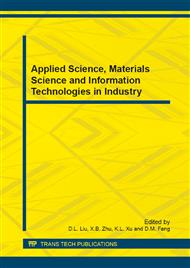p.3667
p.3671
p.3675
p.3680
p.3684
p.3688
p.3691
p.3695
p.3699
Research on Skew Imaging Simulation of Frame Cameras
Abstract:
Nowadays, most imaging simulation focus primarily on image quality, but the light path of an image sensor should be simulated in many application areas. So, skew imaging simulation of a frame camera has been researched in the paper. The main idea is that the pixels of a known vertical image in the vertical photosurface will be transferred to the corresponding pixels in the skew photosurface along the light path. First, several coordinate systems are set up to describe the space coordinates of a pixel. Then, the relationship between the vertical photosurface and the skew photosurface are built based on the collinearity equation. Finally, the skew image will be generated from the known vertical image by the method of indirect re-sampling. The theoretical analysis and experiment results show that the proposed method can simulate the skew imaging rule very well.
Info:
Periodical:
Pages:
3684-3687
Citation:
Online since:
February 2014
Authors:
Keywords:
Price:
Сopyright:
© 2014 Trans Tech Publications Ltd. All Rights Reserved
Share:
Citation:


